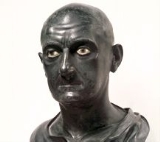
) was a Greek historian of the Hellenistic Period
noted for his work, The Histories
, which covered the period of 220–146 BC in detail. The work describes in part the rise of the Roman Republic
and its gradual domination over Greece
. Polybius is also renowned for his ideas concerning the separation of powers
in government, later used in Montesquieu's The Spirit of the Laws
and in the drafting of the United States Constitution
.
Polybius was born in Arcadia
around 200 BC.
Since the masses of the people are inconstant, full of unruly desires, passionate, and reckless of consequences, they must be filled with fears to keep them in order. The ancients did well, therefore, to invent gods, and the belief in punishment after death.![]()
This is a sworn treaty made between us, Hannibal ... and Xenophanes the Athenian ... in the presence of all the gods who possess Macedonia and the rest of Greece.![]()
How highly should we honor the Macedonians, who for the greater part of their lives never cease from fighting with the barbarians for the sake of the security of Greece? For who is not aware that Greece would have constantly stood in the greater danger, had we not been fenced by the Macedonians and the honorable ambition of their kings? ![]()
For what gives my work its peculiar quality, and what is most remarkable in the present age, is this. Fortune has guided almost all the affairs of the world in one direction and has forced them to incline towards one and the same end; a historian should likewise bring before his readers under one synoptical view the operations by which she has accomplished her general purpose.
![]()
We can get some idea of a whole from a part, but never knowledge or exact opinion. Special histories therefore contribute very little to the knowledge of the whole and conviction of its truth. It is only indeed by study of the interconnexion of all the particulars, their resemblances and differences, that we are enabled at least to make a general survey, and thus derive both benefit and pleasure from history.
![]()

